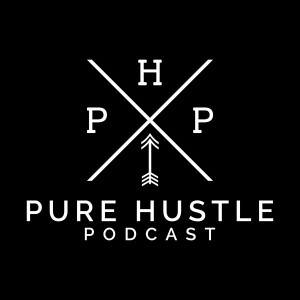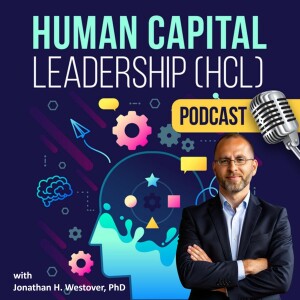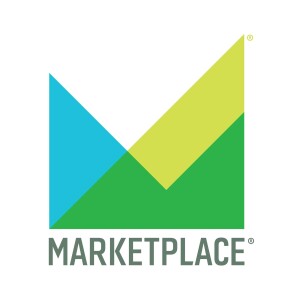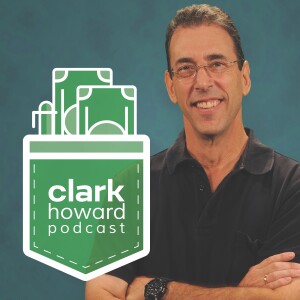

The Cashflow Show: Entrepreneurship Insights for Founders, CEOs and Business Leaders
https://feeds.transistor.fm/the-cashflow-showEpisode List

London’s Global Investment Edge: Jace Tyrrell on Attracting £100B in Capital
Episode Summary: London is the world’s most traded real estate city, but its investment dominance isn’t guaranteed! In this episode of The Cashflow Show, host Clayton M. Coke interviews Jace Tyrrell, CEO of Opportunity London, about attracting £100 billion in real estate, energy, and infrastructure investment. They discuss rising construction costs, sovereign risks, and AI’s impact on office spaces, plus opportunities from US university expansions. Discover how businesses can navigate high costs, leverage infrastructure projects, and capitalize on London’s dynamic market to drive growth. Tune in for expert insights and visit Opportunity.London to explore investment projects worth £100M–£1.5B!Key Discussion PointsLondon’s Investment Appeal: London remains the top global real estate market, driven by scale, a dynamic 10-million population, 300 languages, top universities, and a thousand-year-old legal system (06:19–07:11).Risks to Investment Hub Status: Rising inflation, cost of capital, and housing challenges threaten London’s edge; upcoming budget decisions will impact global investor confidence (00:58–01:28).High Construction Costs: Post-COVID, costs have risen 40–50%, outpacing asset values. Modern methods of construction (MMC) like digital printing and prefabrication can reduce costs (03:10–03:35).Infrastructure Investment Demand: Investors show strong interest in transport and energy projects, but need clarity on government stability to avoid sovereign risk from shifting policies (04:53–05:49).US University Expansion: Private US universities (e.g., MIT, Harvard) are eyeing London due to visa restrictions and funding cuts, creating opportunities for student housing and affordable real estate (08:03–09:29).AI’s Impact on Offices: AI reduces demand for junior white-collar roles, prompting businesses to design flexible, high-quality office spaces to balance productivity and engagement (09:58–12:06).London Investment Summit: Opportunity London hosts 300 investors to showcase 25 live projects worth £9.1B, fostering deals with public-private partners (12:30–13:22).Sovereign Risk Concerns: Long-term investors need assurance that political shifts won’t alter infrastructure or energy project commitments (05:21–05:49).Housing and Regeneration Needs: Affordable housing and high street regeneration require innovative financing and public-private partnerships to meet London’s growing needs (01:28–04:00).Market Performance: London traded £7.1B in real estate this year, up 14% from last year, but still below pre-COVID £25B, aiming for £15–16B by year-end (07:11–07:33).Key TakeawaysLondon’s global investment dominance relies on its scale, diversity, and legal stability, but faces risks from inflation, housing shortages, and policy uncertainty.Rising construction costs (40–50% post-COVID) demand innovative solutions like modern methods of construction (MMC) to make projects viable.Investors prioritize transport and energy infrastructure but require long-term government commitment to mitigate sovereign risk.US university expansions offer investment potential in student and affordable housing, boosting London’s real estate market.AI-driven office space shifts call for flexible, premium workspaces to maintain productivity and attract talent.Notable Quotes“London is still and hopefully will continue to be the most globally traded real estate city in the world.” – Jace Tyrrell (00:29)“Global capital has a choice... We’re in a race for that capital, which is why our partnership was set up to help us win that race for London.” – Jace Tyrrell (00:58)“The housing challenge for most global cities is very acute in London. We have a 10 million population, a very dynamic and talented workforce.” – Jace Tyrrell (01:28)“We need to design the offices of the future... AI is a disruptor, particularly in white-collar [roles].” – Jace Tyrrell (10:49)“We’re unveiling five new projects for the capital tomorrow worth about 9.1 billion.” – Jace Tyrrell(13:22)Actionable Insights for BusinessesAdopt Modern Construction Methods: Use digital printing and prefabrication to reduce construction costs by up to 40–50%, making real estate projects more viable.Engage in Public-Private Partnerships: Collaborate with local authorities and the mayor’s office to unlock housing and infrastructure projects, ensuring deliverability.Design AI-Ready Workspaces: Invest in flexible, high-quality office spaces to balance remote work and in-person collaboration, enhancing productivity amid AI disruptions.Target University-Driven Opportunities: Explore investments in student housing and faculty accommodations as US universities expand into London.Mitigate Sovereign Risk: Advocate for stable government policies in budget discussions to assure investors of long-term project reliability.ResourcesOpportunity London Website: Explore investment projects worth £100M–£1.5B at www.opportunity.london.London Investment Summit Details: Learn about live projects and connect with partners at www.opportunity.london/summit.The Cashflow Show can be reached here:Website: www.thecashflowshowpodcast.com Email: thecashflowshowpodcast@gmail.comTwitter: https://twitter.com/thecashflowshow Instagram: https://instagram.com/thecashflowshowpodcastTo sponsor or advertise on The Cashflow Show Podcast, contact us at thecashflowshowpodcast@gmail.comClayton M Coke can be found here:LinkedIn: https://uk.linkedin.com/in/claytoncokeWebsite: https://www.prmsltd.co.ukEmail: info@prmsltd.co.uk Twitter: https://twitter.com/prmsltd Instagram: https://www.instagram.com/prmsltd/ Our theme music is called "The Mediator - aka Theme from The Cashflow Show" [PRS] and "Better Call Clayton" [PRS] As an Amazon Associate I earn from qualifying purchases. “What are YOU like?”, “60 Second Shoot-Out” &"What About The Tech?" are all intelle...

UK Workers Miss Nearly Two Weeks a Year: Tackling Soaring Absence Rates with Rachel Suff - CIPD
Episode SummaryUK employees are missing nearly two full working weeks a year due to sickness—9.4 days on average, the highest in over a decade!In this episode of The Cashflow Show, host Clayton M. Coke speaks with Rachel Suff, Senior Wellbeing Advisor at the Chartered Institute of Personnel and Development (CIPD), about their latest survey revealing drivers like mental ill health (41% of long-term absences) and stress (26% of short-term absences). They explore the post-pandemic rise and proactive strategies for businesses.Key Discussion PointsRising Absence Rates: UK employees averaged 9.4 sick days last year, up from 7.8 in 2023 and 5.8 pre-pandemic, equating to nearly two working weeks (00:58–01:27).Long-Term Absence Causes: Primarily driven by mental ill health (41%), back/neck pain injuries, and other long-term conditions like cancer (01:56–02:26).Short-Term Absence Drivers: Mainly minor illnesses (78%), with mental ill health (29%) and stress (26%) also significant, often scattered throughout the year (05:17–05:47).Mental Health Trends: Mental ill health has risen post-pandemic due to increased openness, global events, and life pressures like caring responsibilities; it fluctuates on a spectrum including anxiety, depression, and stress (03:23–04:47).Demographic Factors: Nearly 9 million people in the UK have long-term health conditions, exacerbated by an aging workforce more susceptible to disabilities (02:26–02:55).Data and Prevention: Organizations must collect absence data to identify risks, differentiate causes, and proactively manage both short- and long-term absences through supportive conversations (06:14–07:09).Manager Training Needs: Many small businesses lack HR support; good management principles like empathy and flexibility help spot issues early, with signposting to GPs for serious conditions (07:38–09:32).Health Benefits Impact: Providing affordable options like counseling, employee assistance programs, or health cash plans can reduce absences and is highly valued by employees (10:29–11:56).Stress Management Tools: Employers have a legal duty to prevent stress via HSE tools like risk assessments and management standards addressing demands, control, change, and relationships (12:24–14:18).First Steps for New Leaders: Gather health and absence data, review employee surveys, identify risks, train managers, and implement supportive policies like flexible working (14:48–16:38).Key TakeawaysSickness absence has surged to 9.4 days per employee annually, driven by mental health, minor illnesses, and long-term conditions, with an aging workforce adding pressure.Mental ill health is the top cause of long-term absences (41%), amplified by pandemic effects and greater societal openness to discussing it.Proactive data collection and manager training are essential to differentiate causes and prevent absences, rather than reacting after they occur.Affordable health benefits like counseling or cash plans can significantly reduce absences, especially in small businesses.HSE stress tools, including risk assessments, help mitigate workplace stressors like heavy workloads and poor relationships.Notable Quotes“It is nearly two full working weeks, but that is an average. Some employees might just have one or two days... but others with more serious health conditions could be off for longer.” – Rachel Suff (01:27)“Mental ill health comprises conditions like anxiety or depression, which can really vary... And there's also stress, which isn't a clinical condition, but can cause physical and mental health symptoms.” – Rachel Suff (04:47)“It's really important to keep in touch... Don't let absence drift, keep in touch with people.” – Rachel Suff (07:09)“A lot of people are living, more people are working with a health condition than they're not, and they are managing their health issue.” – Rachel Suff (10:01)“Employers in this country are under a legal duty to protect people from stress and there are really good tools available to help them manage that.” – Rachel Suff (12:54)Actionable Insights for BusinessesCollect and Analyze Data: Review absence patterns, employee surveys, and health risks specific to your organization to identify main causes like stress or minor illnesses.Train Managers Proactively: Equip line managers with skills for empathetic conversations, early issue spotting, and supportive return-to-work plans to reduce short-term absences.Implement Stress Prevention Tools: Use HSE management standards for risk assessments on demands, control, change, and relationships to legally mitigate workplace stress.Offer Affordable Health Benefits: Introduce cost-effective options like employee assistance programs or health cash plans to support mental health and minimize long-term absences.Foster Flexibility and Support: Provide temporary adjustments like flexible hours for those managing health conditions or caring responsibilities, promoting a culture of open dialogue.ResourcesCIPD Health and Wellbeing at Work 2025 Survey Report: Download the full report with findings and top tips at www.cipd.org/uk/knowledge/reports/health-well-being-work/.HSE Stress Management Tools: Access risk assessments and management standards at www.hse.gov.uk/stress/.Simplyhealth Homepage.The Cashflow Show can be reached here:Website: www.thecashflowshowpodcast.com Email: thecashflowshowpodcast@gmail.comTwitter: https://twitter.com/thecashflowshow Instagram: https://instagram.com/thecashflowshowpodcastTo sponsor or advertise on The Cashflow Show Podcast, contact us at thecashflowshowpodcast@gmail.comClayton M Coke can be found here:LinkedIn: https://uk.linkedin.com/in/claytoncokeWebsite: https://www.prmsltd.co.ukEmail: info@prmsltd.co.uk Twitter: https://twitter.com/prmsltd Instagram: https://www.instagram.com/prmsltd/ Our theme music is called "The Mediator - aka T...

Hybrid Working: A Threat to Young Workers’ Careers and Mental Health? | Natasha Devon MBE
Is hybrid working stunting the growth of your youngest employees? Nearly half of 18–24-year-olds say it’s hurting their workplace relationships and mental health!In this episode of The Cashflow Show Podcast, host Clayton M. Coke interviews Natasha Devon, MBE, writer, broadcaster, and mental health activist, to explore new research from the Institution of Occupational Safety and Health (IOSH). Natasha unpacks why 48% of young workers struggle to build relationships and 17% report worsening mental health in hybrid setups, and how businesses can adapt.Learn how to redesign hybrid models to support young workers with structured feedback, mentoring, and collaboration opportunities, ensuring they thrive in today’s workplace.Tune in to discover practical strategies to boost engagement, retention, and mental well-being for the next generation of talent, and visit IOSH for actionable resources.Key Discussion PointsRise of Hybrid Working: Accelerated by COVID lockdowns, hybrid models benefit established workers but pose challenges for younger employees entering the workforce (01:19–02:13).Relationship Struggles: 48% of 18–24-year-olds find it hard to build workplace relationships due to limited face-to-face interaction in hybrid setups (02:39–03:07).Mentoring Gaps: Only 16% of entry-level staff receive regular mentoring, leaving young workers without critical guidance to learn the ropes (03:36–09:08).Mental Health Impact: 17% of young workers report worsened mental health, with 50% citing cost of living as a top stressor, compounded by isolation and lack of feedback (05:46–07:40).Solutions for Equity: Structured check-ins (desired by 45%), in-person mentoring, and face-to-face collaboration (wanted by 35%) can support young workers’ growth (04:27–14:44).Employer Mindset Shift: Open dialogue and anonymous feedback systems can address young workers’ needs, breaking from outdated top-down management styles (09:36–11:04).Cost of Living Concerns: Financial stress affects 50% of young workers; employers can help with solutions like subsidized transport or community partnerships (11:33–12:20).Collaboration Challenges: Hybrid setups scatter teams, but hot-desking or rented communal spaces can foster in-person collaboration (14:44–15:40).Key TakeawaysHybrid working, while beneficial for some, hinders young workers’ ability to form relationships and access mentoring, impacting their career growth.Mental health suffers due to isolation, lack of feedback, and financial stress, with 17% of young workers reporting a decline in well-being.Structured weekly check-ins, in-person collaboration, and mentoring are critical to supporting young workers in hybrid environments.Employers must prioritize open dialogue and anonymous feedback to understand and address young workers’ unique needs.Creative solutions like subsidized transport or shared workspaces can alleviate financial and collaboration challenges, boosting retention.Notable Quotes“48% of 18–24-year-olds struggle to build workplace relationships. That’s almost half.” – Natasha Devon (03:07)“When you don’t name something, it becomes invisible. Young people need that constant constructive feedback to learn the ropes.” – Natasha Devon (03:36)“If you’re doing everything remotely, potentially four of the five key human psychological needs are suffering.” – Natasha Devon (06:15)“Short-termist thinking like using AI or online training saves money now, but mental health issues cost more down the line.” – Natasha Devon (07:10)“The number one fear of employees is if I talk about my struggles, it’ll affect my career progression. Anonymous feedback removes that fear.” – Natasha Devon (16:11)Actionable Insights for BusinessesImplement Structured Check-Ins: Schedule regular, short feedback sessions (2–3 times weekly) to provide young workers with clear guidance and reduce isolation.Prioritize In-Person Mentoring: Carve out face-to-face training time, especially for entry-level staff, to replicate informal guidance lost in hybrid setups.Foster Collaboration: Use hot-desking or rented communal spaces for periodic in-person team meetings to boost collaboration (desired by 35% of workers).Address Financial Stress: Offer cost-of-living support like subsidized transport or local business partnerships to ease financial burdens and improve morale.Encourage Open Dialogue: Create anonymous feedback systems to allow young workers to voice concerns without fear of career repercussions, fostering trust.ResourcesInstitution of Occupational Safety and Health (IOSH): Visit www.iosh.com for tips on supporting young workers in hybrid workplaces.Where’s Your Head At? Campaign: Learn about Natasha Devon’s mental health advocacy at www.wheresyourheadat.org.Learn about Natasha Devon’s show on LBCThe Cashflow Show can be reached here:Website: www.thecashflowshowpodcast.com Email: thecashflowshowpodcast@gmail.comTwitter: https://twitter.com/thecashflowshow Instagram: https://instagram.com/thecashflowshowpodcastTo sponsor or advertise on The Cashflow Show Podcast, contact us at thecashflowshowpodcast@gmail.comClayton M Coke can be found here:LinkedIn: https://uk.linkedin.com/in/claytoncokeWebsite: https://www.prmsltd.co.ukEmail: info@prmsltd.co.uk Twitter: https://twitter.com/prmsltd Instagram: https://www.instagram.com/prmsltd/ Our theme music is called "The Mediator - aka Theme from The Cashflow Show" [PRS] and "Better Call Clayton" [PRS] As an Amazon Associate I earn from qualifying purchases. “What are YOU like?” & “60 Second Shoot-out” are both intellectual properties of Dialogue [London] Ltd(c) Clayton M Coke/PRMS Ltd/Dialogue [London] Ltd | All Rights Reserved ★ Support this podcast ★

Why 40% of Adults Struggle with Confidence in Learning New Skills – Insights from Prof. Steve Peters
Are you or your team struggling to embrace new skills at work? You’re not alone—40% of adults face a confidence dip when learning, with career optimism peaking at just 25!In this episode of The Cashflow Show Podcast, host Clayton M. Coke sits down with Professor Steve Peters, consultant psychiatrist and author of The Chimp Paradox, to unpack new research revealing why so many adults lose confidence in skill development. Professor Peters explains the neuroscience behind this dip, how the brain’s risk-averse "Chimp" system holds us back, and how to unlock untapped potential for career growth.Discover practical strategies to overcome fear of failure, reframe self-perception, and foster a workplace culture that boosts confidence and innovation. Whether you’re a business leader or an employee, this episode offers actionable insights to thrive in today’s fast-evolving workplace.Key TakeawaysConfidence dips post-25 due to the brain’s shift to risk aversion, but this can be reversed by reframing failure and self-perception.Comparing yourself to others or perfectionism undermines confidence; focus on personal growth and realistic goals instead.Employers can unlock employee potential by fostering a culture of emotional skill-building and flexible learning opportunities.The Skills for Life campaign provides accessible resources to help adults and businesses upskill, from apprenticeships to online learning.Managing the "Chimp" brain through mindset shifts can lead to greater resilience, risk-taking, and career progression.Notable Quotes“Dealing with failure is a myth. What we’re really saying is I can’t deal with the consequences of failure, which is different. As adults, we can deal with anything.” – Professor Steve Peters (02:24)“If we keep comparing to others and to perfection, we naturally lose confidence because we always perceive others as better.” – Professor Steve Peters (03:20)“If I perceive myself as a proactive go-getter, my brain won’t let me sit back because it feels wrong.” – Professor Steve Peters (05:15)“One in three adults remain curious about their untapped potential. Couldn’t this do fantastic things for businesses and the economy?” – Clayton M. Coke (06:14)“Get yourself in a good place psychologically. Learn about your mindset, and everything else is plain sailing.” – Professor Steve Peters (09:56)Actionable Insights for BusinessesFoster Emotional Skills: Train employees in emotional intelligence to manage the "Chimp" brain, reducing fear of failure and boosting confidence in learning new skills.Encourage Flexible Learning: Leverage programs like Skills for Life to offer diverse training options (e.g., online courses, mentorship) tailored to individual needs.Reframe Failure: Create a workplace culture that views setbacks as manageable consequences, encouraging risk-taking and innovation.Tap into Curiosity: Identify and nurture the 30% of employees curious about their potential to drive business growth and engagement.Promote Proactive Mindsets: Help employees reframe self-perception as proactive and capable, reducing reluctance to upskill or take on new challenges.ResourcesSkills for Life Campaign: Visit www.skillsforcareers.education.gov.uk to explore apprenticeships, boot camps, and online learning opportunities.The Chimp Paradox by Professor Steve Peters: Learn more about managing your mindset with this bestselling book, available at major bookstores A Path Through the Jungle by Professor Steve Peters: A follow-up book focusing on emotional skills, available at major bookstores .The Cashflow Show can be reached here:Website: www.thecashflowshowpodcast.com Email: thecashflowshowpodcast@gmail.comTwitter: https://twitter.com/thecashflowshow Instagram: https://instagram.com/thecashflowshowpodcastTo sponsor or advertise on The Cashflow Show Podcast, contact us at thecashflowshowpodcast@gmail.comClayton M Coke can be found here:LinkedIn: https://uk.linkedin.com/in/claytoncokeWebsite: https://www.prmsltd.co.ukEmail: info@prmsltd.co.uk Twitter: https://twitter.com/prmsltd Instagram: https://www.instagram.com/prmsltd/ Our theme music is called "The Mediator - aka Theme from The Cashflow Show" [PRS] and "Better Call Clayton" [PRS] As an Amazon Associate I earn from qualifying purchases. “What are YOU like?”, “60 Second Shoot-Out” &"What About The Tech?" are all intellectual properties of Dialogue [London] Ltd(c) Clayton M Coke/PRMS Ltd/Dialogue [London] Ltd | All Rights Reserved ★ Support this podcast ★

Revolutionizing Travel: Alex Cruz on AI, Business and the Future of the Industry
In this dynamic episode of The Cashflow Show, recorded live at Tech Show London 2025, host Clayton M. Coke sits down with Alex Cruz, former CEO of British Airways, now Vice-Chairman of Westjet, to explore the modernization of the travel industry. With 35 years of experience, Alex discusses how outdated systems, like 70-year-old reservation codes, clash with rising customer expectations shaped by digital-first businesses. He delves into the transformative potential of AI in addressing complex operational challenges, boosting revenues, and enhancing customer experiences, while emphasizing the need for a risk-averse industry to embrace experimentation and cultural change. Key Discussion PointsOutdated Systems: The travel industry relies on 70-year-old structures, like six-digit reservation codes, and aging IT systems that struggle to meet modern demands. Customer Expectations: Exposure to seamless digital apps has raised traveler expectations, creating pressure to modernize operations and baggage tracking. AI’s Dual Role: AI is being adopted for internal efficiencies (e.g., data analysis) and solving complex industry challenges, like crew scheduling and dynamic pricing. Revenue Impact: AI-driven pricing solutions can boost airline revenues by 5–10% without significantly affecting customers, leveraging price elasticity. Cultural Barriers: The risk-averse nature of the travel industry slows AI adoption, requiring a cultural shift toward experimentation and learning from failures. Future of AI: AI will reshape competition by enabling faster solution development, but businesses must ask smarter questions to maximize its value.Key TakeawaysThe travel industry’s legacy systems are a bottleneck, unable to keep pace with digital-first customer expectations. AI offers significant opportunities for operational efficiency and revenue growth, but its success depends on cultural openness to experimentation. Businesses must prioritize value generation, with AI delivering measurable results like 5–10% revenue increases through dynamic pricing. The human element—asking the right questions and fostering a learning culture—is critical to leveraging AI effectively. Over the next five years, early AI adopters in travel will gain a competitive edge by solving complex problems faster.Notable Quotes“We’re struggling with bringing together [customer] expectations with our older legacy landscapes.” – Alex Cruz “AI is going to help us… digest many more pieces of information than standard old software or human beings were able to.” – Alex Cruz “The big pressure is going to be on what questions are you asking? What is it that you really want?” – Alex CruzActionable Insights for BusinessesAudit Legacy Systems: Assess outdated IT infrastructure and prioritize modernization to meet customer expectations and stay competitive. Experiment with AI: Start small with AI pilots for internal processes or pricing strategies, learning from failures to refine solutions. Foster a Learning Culture: Encourage teams to embrace risk-taking and experimentation to overcome the industry’s risk-averse mindset. Focus on Value: Ensure AI initiatives deliver clear ROI, such as cost savings or revenue increases, to secure stakeholder buy-in. Ask Smarter Questions: Train teams to define precise problems for AI to solve, maximizing the technology’s impact on business outcomes.ResourcesLinkedIn: Follow Alex Cruz for insights on travel and technology. Tech Show London: Learn about the event at techshowlondon.co.uk. AI in Travel: Explore industry trends via IATA for airline technology advancements. The Cashflow Show can be reached here:Website: www.thecashflowshowpodcast.com Email: thecashflowshowpodcast@gmail.comTwitter: https://twitter.com/thecashflowshow Instagram: https://instagram.com/thecashflowshowpodcastTo sponsor or advertise on The Cashflow Show Podcast, contact us at thecashflowshowpodcast@gmail.comClayton M Coke can be found here:LinkedIn: https://uk.linkedin.com/in/claytoncokeWebsite: https://www.prmsltd.co.ukEmail: info@prmsltd.co.uk Twitter: https://twitter.com/prmsltd Instagram: https://www.instagram.com/prmsltd/ Our theme music is called "The Mediator - aka Theme from The Cashflow Show" [PRS] and "Better Call Clayton" [PRS] As an Amazon Associate I earn from qualifying purchases. “What are YOU like?” & “60 Second Shoot-out” are both intellectual properties of Dialogue [London] Ltd(c) Clayton M Coke/PRMS Ltd/Dialogue [London] Ltd | All Rights Reserved ★ Support this podcast ★
Create Your Podcast In Minutes
- Full-featured podcast site
- Unlimited storage and bandwidth
- Comprehensive podcast stats
- Distribute to Apple Podcasts, Spotify, and more
- Make money with your podcast












